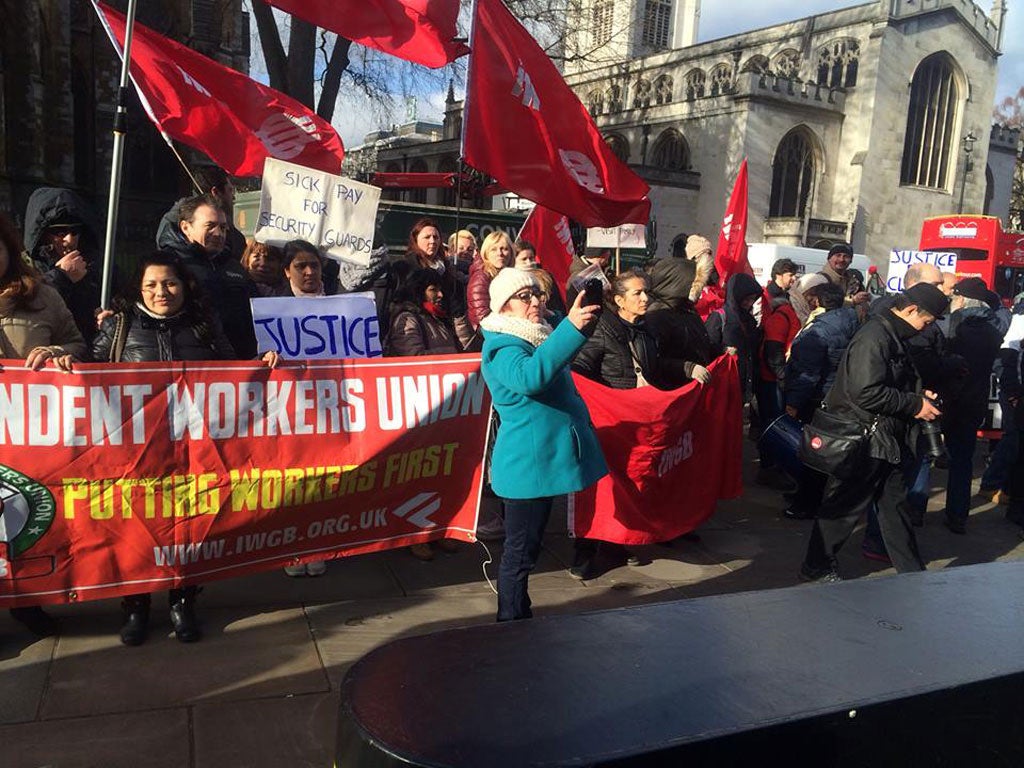European legislation is powering this week's biggest court case over workers' rights – Theresa May will come for it after Brexit
The rights of poorly paid outsourced workers at the University of London – if they win their case under the European Convention on Human Rights – might be the first for the axe if the Prime Minister ever draws up an alternative


When employers outsource work to contractors, agencies or other bodies, the consequences for the workers performing the affected functions is almost inevitably grim.
Employment agencies, facilities management companies and the like don’t make handsome profits through being nice to the people that work for them.
Far from it, given that the money employers seek to save is typically recouped from the pay packets of their cleaners, porters, security guards, etc. The very people who didn’t earn much even before their roles were outsourced.
Depressingly, it’s a practice indulged in by organisations one might normally consider to be progressive. Universities, for example. Happily, however, there is change in the air, with workers at one of the latter in the vanguard.
Support staff at the University of London are launching a landmark legal challenge over the way they are treated.
The Independent Workers Union of Great Britain is going to argue that these workers should have the right to collectively bargain their pay and conditions directly with the university, rather than through the facilities management company that officially employs them.
When the case comes before the Central Arbitration Committee, it will argue that when it comes to their day to day working lives, it is the university that calls the shots.
Its managers assign tasks to its receptionists, security staff, cleaners, porters and post-room workers. It also ultimately pays their wages, through the money that is kicked over to the facilities management company, and has the dominant influence over their working lives.
That being the case, say the workers, shouldn’t we therefore be able to bargain with the university as our ultimate employer? Well, shouldn’t they?
The logic of the case is airtight, even if its soundness in law is up for debate, and will be for some time. Cases like this usually go to appeal. There are very good reasons for an institution to take cases like this all the way – particularly this one.
It isn’t just the University of London that could be affected if it loses: so could many of its peers, and large parts of the public sector – not to mention the private sector, where the enthusiasm for outsourcing borders on mania.
In the meantime, get set for some fun and games as battle is joined. They’ll begin tonight when the University’s glitterati are set to have their dinner-jacketed anniversary hobnobbing with their Chancellor Princess Anne interrupted by a demonstration, staged by the people who keep the place running.
There is also, however, a wider and more serious point to be made: the workers’ case for decent treatment is being brought under the European Convention on Human Rights (ECHR), to which the UK is a signatory.
This is not, therefore, a Brexit issue – even though that process by itself is likely to result in a bonfire of workers’ rights under the wretched Conservative Government that is ramming it through. It might, however, become an issue after it is done.
The aforementioned Government, and its dogs in the right-wing press, have regularly taken shots at the ECHR, despite the key role Britain played in drafting it after the Second World War.
This typically occurs when the ECHR (which is also independent of the European Union, even though the two are regularly confused) asks the UK to stop behaving disgracefully.
If the workers win through it, the protections they stand to secure will be at risk should Theresa May turn her attentions to pulling out of it.
You could add them to the right to a fair trial, the right to privacy, the right to freedom from torture and degrading treatment, a guarantee of freedom of religion and of expression, the protection of victims of domestic violence and the right to freedom from slavery.
Not to mention the guarantee of peace in Northern Ireland, if the Good Friday Agreement actually survives the Government’s mishandling of Brexit. They’re all guaranteed by and under the convention.
No, they won’t all go should the UK withdraw from it. Even Theresa May isn’t quite that crass.
But do you trust a Government led by her, or by one of the rogue’s gallery that sit with her on the front benches, to protect them all via a British Bill of Rights with the same strength of the ECHR? I don’t.
The rights of poorly paid outsourced workers – if they win their case under the Convention – might be the first for the axe if she ever draws up an alternative. I don’t think they will be the last.


Join our commenting forum
Join thought-provoking conversations, follow other Independent readers and see their replies